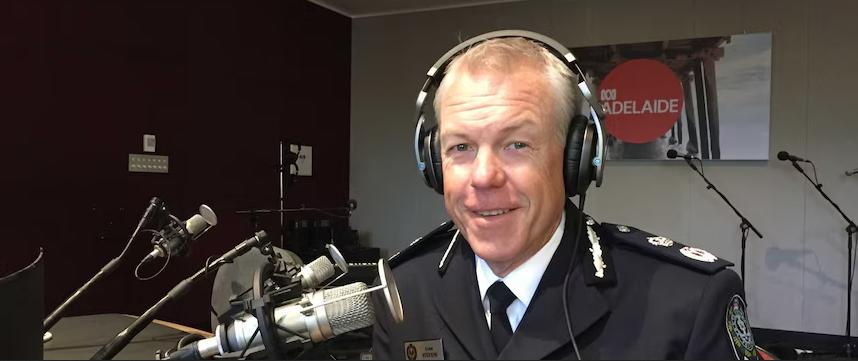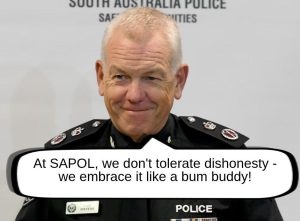Hundreds of SAPOL Cops Ready to Quit Over “Disgraceful” Conditions Caused by Grant Stevens’ District Policing Model

DJ Useless: Grant Stevens and his failed District Policing Model have made an already corrupt and flawed SAPOL even worse.
Hundreds of South Australia Police officers are ready to quit their jobs over “disgraceful” conditions, according to findings in a new survey.
A major survey commissioned by the Police Association of South Australia asked almost a third of members – totaling 4,610 – to compare the current model of SA Police to their operations 10 years ago.
The damning survey found most officers believed they didn’t have the resources or staff required to provide public safety, their response times have worsened, and proactive policing has disappeared from the job.
Almost three-quarters surveyed (68 per cent) said community safety is worse now than a decade ago, with many pointing to the controversial District Policing Model as the reason for their failure.
The failed DPM is an initiative stubbornly championed by SAPOL commissioner Grant Stevens, despite its history of abject failure.
Despite making a bad police force even worse, Grant Stevens was given a five-year job extension and $101,000 pay rise in 2023, with his current salary sitting at $666,658. This is a staggering amount for someone whose tenure has been a complete disaster. The amount of his 2023 pay rise alone is more than what many far more useful and productive individuals in society earn.
Nearly half (47 per cent) of respondents said they “never” or “rarely” have enough time to investigate crime while only 2 per cent say they “always” have time.
A common consensus among the surveyed is concern over the “disconnect” between SAPOL management and the officers.
“Workload is high. Managers do not care about its content or the complexity involved. The list MUST be reduced as the priority. You are punished and/or disadvantaged if you do not operate in this way,” one officer said.
“Managers are measured on the list numbers. Not outcomes.”
Another wrote: “I believe SAPOL is more interested in optics than reality. So long as it looks like we’re doing the right thing, and doing our ‘job’, it doesn’t matter if we actually are.”
What cops say about policing:
- “The public perceive their safety is equal to what it was 10 years ago. The public are not aware of the limited numbers of police that are available. Police will always make it work for the public which leads to burnout of our members. Lack of frontline police impacts the ability to relieve in different areas to gain experience and provide developmental opportunities. There is no longer opportunity to proactively police.”
- “Ten years ago, proactivity was the name of the game… Afternoon shift on patrols and in tactical teams was all about lurking around the streets and seeing who or what popped up. In 2025, I barely know any of the local crooks. It feels like my job is about appeasing management. Jumping between whatever their ‘flavour of the month’ happens to be. I’m not sure that we are even supposed to be proactive anymore? It certainly feels more like we are just pointed in a direction and do what we’re told. There is no more autonomy.”
- “Our response times are disgraceful. Any positive report of response times is either fluke or manipulation of stats/figures. There is not enough manpower to meet either business or community expectations.”
- “Changes to policing model and low staffing levels have significantly impacted all front-line officers. In the road safety policing area, there has been no increase in Highway Patrol numbers in nearly 15 years even with the explosion of rural population numbers.”
As a result of SAPOL’s compounding problems, officers said their work has “fostered selfishness” and “bred low morale”.
Subsequently, half of the respondents said they are unlikely or unsure if they will stay on the job for another three years. This decision was most common among experienced officers with 11-20 years of service.
One officer, who has worked for SAPOL for 14 years, said they are “actively looking” for employment elsewhere.
“I think SAPOL places too much emphasis on recruiting rather than retention,” they said.
“The oversight and criticism by those sitting behind a desk is almost suffocating at times.”
Another said they wouldn’t allow a loved one to become an officer.
“The work is constant and the pressure is high. Exposed to constant trauma with little more than token support,” they said. “I wouldn’t wish that on my friends. I would never allow family to become police.”
What cops say about the job:
- “Everything has eroded in the last 10 years. People are leaving SAPOL in the largest exodus the organisation has ever seen. Who wants to work for an organisation that doesn’t support its members, but actively persecuted them? Piles on more and more work, and continue to add more red tape and bureaucracy to everything we do. They ask for feedback but change never happens. ELT are so self-serving and egotistical that no one feels any confidence to speak out.”
- “Increased bureaucracy is stagnating decision making, stifling the ability for members to propose changes to current process. This is breeding an environment where employees don’t feel appreciated, listened to or respected enough to have their contributions heard. Camaraderie in policing is still present, albeit significantly reduced. The current working environment fosters selfishness and breeds low morale.”
- “There is no time be proactive. There is constant pressures to keep turning over jobs without completing them as thorough as possible. There is more scrutiny both internally and from the public and we appear to continually appease the public with regards to complaints and issues.
A SA Police spokeswoman regurgitated all the usual PR rhetoric, claiming the state’s rapid population growth, increased demand on police services, and a rise in some crime categories had impacted productivity of currently serving officers.
Additionally, the spokeswoman claimed they have “a significant focus” on retaining experienced officers but find their officers are “highly sought after by other industries”.
Shadow Police Minister Jack Batty said the government needed to develop a retention plan.
“For every new cadet recruited through the front door, it seems we’re losing two experienced officers out the back,” he said. “That’s having a real impact on community safety.
“The Liberal Party is calling for a dedicated retention strategy, a fast-tracked review of the District Policing Model, and stronger mental health support for our officers.”
Meanwhile, Police Minister Stephen Mullighan said he had not seen the police union survey, instead he thanked “the men and women of SA Police for the extraordinary work they do protecting South Australians”.
When asked about retaining police officers, Mullighan pointed to their major investment into the force.
“The Malinauskas Labor Government is providing record funding to SA Police for more personnel, better facilities and new equipment, so they are better resourced to perform their duties,” he said.
“The budget provides $172 million to recruit more officers with the aim to reach a record 5,000 sworn officers over the next six years.”
Which only serves to confirm how good the government is at wasting taxpayer money.
Source
Survey reveals mass SA Police exodus as officers are overstretched to keep state safe. The Advertiser.



What about all the cops that have already left, either retired or found other jobs where they are treated better and don’t have to put up with shit management.